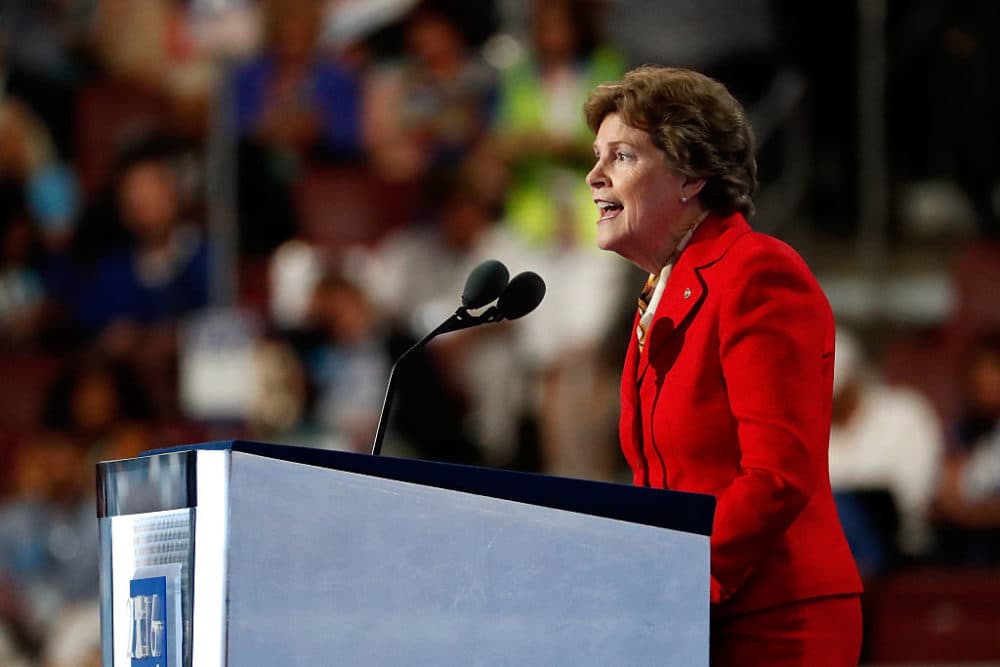Advertisement
New Hampshire Sen. Jeanne Shaheen Says Primary Voters Are 'Engaged,' Projects Record Turnout
Resume
The Concord Monitor’s front-page headline reads “Uncertainty looms” Monday as many voters are still undecided ahead of the New Hampshire Democratic primary.
A key group to watch in this contest are the state’s undeclared voters, who make up 42% of the electorate and can vote in the state’s Democratic primary. The nominating contest comes one week after the debacle in Iowa, where problems with a smartphone app delayed the results.
The problems in Iowa are part of the larger issue with caucuses in general, says New Hampshire Democratic Sen. Jeanne Shaheen. Some states shifted to holding primaries instead of caucuses this year.
“I think the caucus system is kind of a carryover from years ago,” she says. “I think there's been an effort for some time now to try and encourage states to move away from caucuses and go to direct voting.”
But in New Hampshire, Iowa seems to be in the rearview mirror. New Hampshire’s secretary of state is projecting record turnout in Tuesday’s primary, even higher than in 2016 when the state had contests on both sides of the aisle.
“I think that means that Democratic voters are very excited here,” Shaheen says. “There's a lot of enthusiasm. They're gonna go to the polls on Tuesday.”
Interview Highlights
On the criticism of Iowa and New Hampshire holding the first nominating contests
“New Hampshire is not about having the most diverse population. I think the nominating process added Nevada and South Carolina in a way to ensure that diversity is reflected. What's important in New Hampshire is that we have a very engaged electorate. We have one of the highest voter turnouts of any state in the country. And we need to be able to have a place where you can come, if you don't have the most money and name recognition, and be able to talk to voters about your vision for the country and where we need to take America.”
On the New Hampshire primary coming after the impeachment trial
“Well, it was disappointing to me to see that the president didn't take the opportunity, with the impeachment over, to reach across the aisle.
“I didn't think it was appropriate when the president refused to shake the speaker's [Nancy Pelosi’s] hand. And I don't think it's appropriate for [Pelosi] to have torn up the speech.”
On New Hampshire voters’ biggest concerns going into the primary
“Health care, you know, whether it's the high cost of prescription drugs. We have a number of different plans on the Democratic side among our candidates who all are talking about one of the things that would most lower prescription drug costs is if we allow the centers for Medicaid and Medicare to actually negotiate with the drug companies. And the Republicans and the president have refused to acknowledge that that would lower costs.”
On the tug of war within the Democratic Party over health care
“I've been involved in Democratic politics for a long time. I remember the fight between the liberal wing and the moderate wing when I was working for Jimmy Carter. So this is not unusual and not surprising. And I think the important thing is that every Democratic candidate is talking about expanding health care to all Americans.”
On her own race for re-election and why people should vote for her
“I think we've got a big difference between where I stand on issues like health care, lowering prescription drug costs, as I've said, and where my opponents stand. They all want to overturn the Affordable Care Act. My opponents all stand with President Trump on issues like the tariffs. Now, the president signed the United States-Mexico-Canada Trade Agreement, which I support. And we need to be able to work together to address the challenges that we face.
“I think trying to address China's bad behavior is very important. I think there are other ways that we could be doing it that have less of an impact on businesses.”
On combating foreign interference in the 2020 election
“I think we all need to be vigilant about foreign interference.
“We're also hearing that there were phones jammed in Iowa. As my campaign was a victim of a phone jamming scheme by the Republican Party in 2002, I hope that what goes on here is not the Republican Party trying to interfere with the election. We've been doing the New Hampshire primary for about 100 years now. I have every expectation and belief that people will be enthusiastic, and then it will go very well.”
Jill Ryan produced and edited this interview for broadcast with Kathleen McKenna. Samantha Raphelson adapted it for the web.
This segment aired on February 10, 2020.
